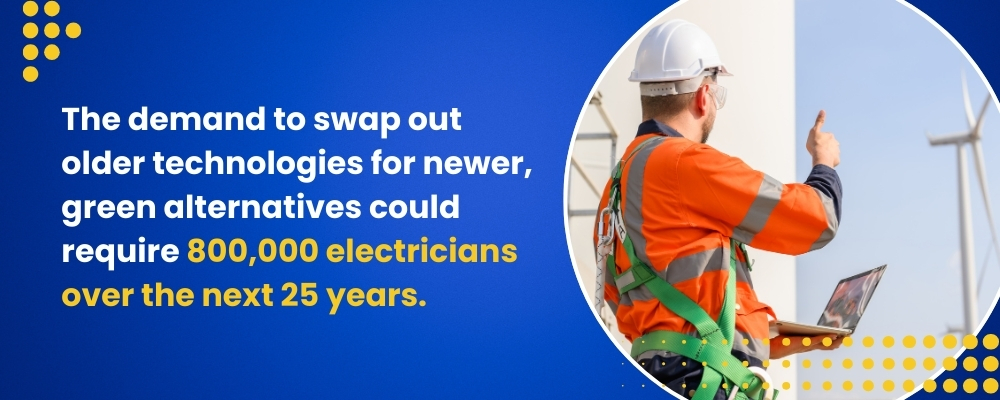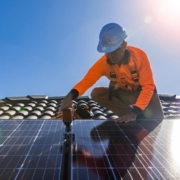Sustainability is more than a fleeting trend. Clean energy-focused jobs have grown in every state, and the need for trained electrical professionals will continue to increase. The 2023 U.S. Energy and Employment Report (USEER) revealed the energy workforce added 300,000 jobs in 2022, and clean-energy jobs grew to represent 40% of all energy jobs.
One of the major sustainable movements centers around green buildings. Commercial property builders and homeowners are both making strides toward sustainable practices. Integrating renewable energy sources such as solar panels, wind turbines, hydrogen, and electrification mitigates reliance on fossil fuels.
What does this mean for electrical industry professionals? Read on to learn how these exciting changes will increase job growth.
Sustainable Solutions & Job Growth
In the Pacific Northwest, we care about our environment and have standards for our communities, which is a driving force behind a more sustainable future and green job creation. Plus, thanks to the CHIPS Act and other green building initiatives, careers in the electrical market are booming nationwide.
According to the USEER in 2022:
- 12,000 solar energy jobs were created
- 5,000 new wind jobs were added
- Electric vehicles created over 28,000 positions
What’s behind the job growth and push for green energy? In addition to the many environmental benefits, sustainable buildings also offer tax credits and savings on energy costs. Through the Inflation Reduction Act, the average household could receive $10,600 to completely electrify. In Oregon, companies could see up to a 40% tax credit for solar installation costs.

The Rise of Renewable Energy Sources for Buildings
Check out how our communities are revolutionizing carbon-neutral building solutions and what that means for our robust electrical sector.
Energy Efficiency Prioritization
The demand for energy-efficient solutions has increased the use of modern technology like smart systems, LED lighting, and innovative appliances. Energy Star reports that implementing energy-saving methods at home or in the office is the most economical approach to lowering energy consumption. Compared to typical buildings, high-performing buildings save annually: $0.60 per square foot on operations and maintenance and $0.53 per square foot on utility expenses. As energy-efficient trends expand, contractors and electricians will be tasked with designing and installing tech-driven systems.
Building Electrification
Alongside energy efficiency, building electrification is another significant move towards greener buildings. Fully electric buildings don’t rely on fossil fuels as a primary energy source and can work in tandem with renewable energy sources and smart technology. They are connected to electrical grids, typically supplied by solar or wind, resulting in lower carbon footprints.
Older structures might need help upgrading their circuit loads to accommodate the modern grid systems. For example, according to Rewiring America, 50-60 million single-family homes contain panels with less than 200 amp ratings. New buildings with higher amperage and intelligent systems will need higher-load panels. The electrical sector will have significant growth opportunities to manage upgrades and build new grid systems.
Electrical Vehicle Infrastructure
Sustainable buildings go beyond heating and cooling. Today’s home and commercial properties will incorporate EV charging stations into design plans. Electrical system upgrades and familiarity with EV tech will be a must for electrical professionals working with green-car technology.
The Demand for Electrical Professionals
With the rise of sustainable buildings comes an increased demand for a tech-savvy electrical industry. According to some recent statistics, the demand to swap out older technologies for newer, green alternatives could require 800,000 electricians over the next 25 years.
In the sustainable future, success awaits both experienced professionals and aspiring electricians who stay ahead through continuous education, training, and hands-on experience with cutting-edge technology.
NECA–IBEW Local 48: Driving Innovation in the Electrical Industry
We’re committed to guiding the electrical industry by setting the standards for quality, skill, competence, value, safety, and integrity. NECA members benefit from advanced tech training, safety support, industry resources, elite electrician access, and education credits. IBEW members elevate careers with ongoing education, job placement, career development, and more.

